| Listing 1 - 10 of 36 | << page >> |
Sort by
|
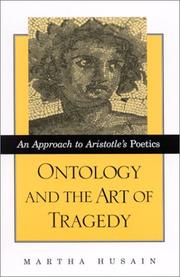
ISBN: 0791489795 0585427771 9780585427775 9780791489796 9780791451434 9780791489796 0791451445 0791451437 9780791451441 Year: 2002 Publisher: Albany State University of New York Press
Abstract | Keywords | Export | Availability | Bookmark
 Loading...
Loading...Choose an application
- Reference Manager
- EndNote
- RefWorks (Direct export to RefWorks)
Ontology and the Art of Tragedy is a sustained reflection on the principles and criteria from which to guide one's approach to Aristotle's Poetics. Its scope is twofold: historical and systematic. In its historical aspect it develops an approach to Aristotle's Poetics, which brings his distinctive philosophy of being to bear on the reception of this text. In its systematic aspect it relates Aristotle's theory of art to the perennial desiderata of any theory of art, and particularly to Kandinsky's.
Tragedy. --- Poetics --- Drama --- History --- Aristotle. --- Aristoteles. --- Ἀριστοτέλης. --- Tragedy --- Poetics - History - To 1500 --- Aristotle. - Poetics
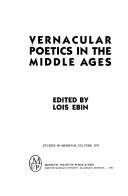
ISBN: 0918720222 0918720192 9780918720191 Year: 1984 Volume: 16 Publisher: Kalamazoo, Mich. Medieval Institute
Abstract | Keywords | Export | Availability | Bookmark
 Loading...
Loading...Choose an application
- Reference Manager
- EndNote
- RefWorks (Direct export to RefWorks)
Poetry --- anno 500-1499 --- Poetry, Medieval --- Poetics --- History and criticism --- History --- Poetry, Medieval - History and criticism --- Poetics - History - To 1500
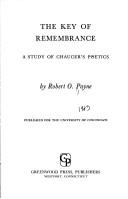
ISBN: 0837166942 9780837166940 Year: 1973 Publisher: Westport ; London : Greenwood press,
Abstract | Keywords | Export | Availability | Bookmark
 Loading...
Loading...Choose an application
- Reference Manager
- EndNote
- RefWorks (Direct export to RefWorks)
Aesthetics, Medieval --- Poetics --- History --- Chaucer, Geoffrey, --- Aesthetics --- Poetics - History - To 1500 --- Chaucer, Geoffrey, - -1400 - Aesthetics --- CHAUCER (GEOFFREY), d. 1400 --- POETRY --- Chaucer, Geoffrey, - -1400
Book
ISBN: 9780367366117 0367366118 0429347278 Year: 2020 Publisher: Abingdon Routledge
Abstract | Keywords | Export | Availability | Bookmark
 Loading...
Loading...Choose an application
- Reference Manager
- EndNote
- RefWorks (Direct export to RefWorks)
"This volume integrates aspects of the Poetics into the broader corpus of Aristotelian philosophy. It both deals with some old problems raised by the treatise, suggesting possible solutions through contextualization, and also identifies new ways in which poetic concepts could relate to Aristotelian philosophy. In the past, contextualization has most commonly been used by scholars in order to try to solve the meaning of difficult concepts in the Poetics (such as catharsis, mimesis, or tragic pleasure). In this volume, rather than looking to explain a specific concept, the contributors observe the concatenation of Aristotelian ideas in various treatises in order to explore some aesthetic, moral and political implications of the philosopher's views of tragedy, comedy and related genres. Questions addressed include: Does Aristotle see his interest in drama as part of his larger research on human natures? What are the implications of tragic plots dealing with close family members for the polis? What should be the role of drama and music in the education of citizens? How does dramatic poetry relate to other arts and what are the ethical ramifications of the connections? How specific are certain emotions to literary genres and how do those connect to Aristotle's extended account of pathe? Finally, how do internal elements of composition and language in poetry relate to other domains of Aristotelian thought? The Poetics in Its Aristotelian Context offers a fascinating new insight to the Poetics, and will be of use to anyone working on the Poetics, or Aristotelian philosophy more broadly"--
Poetics --- History --- Aristotle. --- Poetics (aristotle) --- Philosophy --- HISTORY --- Poetics. --- Ancient --- General. --- Poetics (Aristotle). --- To 1500. --- Aesthetics, Ancient. --- Philosophy, Ancient. --- Poetics - History - To 1500 --- Aristotle. - Poetics
Book
ISBN: 9780190912819 0190912812 0190912839 Year: 2021 Publisher: Oxford Oxford university press
Abstract | Keywords | Export | Availability | Bookmark
 Loading...
Loading...Choose an application
- Reference Manager
- EndNote
- RefWorks (Direct export to RefWorks)
"The poetics of Philodemus of Gadara, who was a first century BCE Epicurean philosopher and poet, whose On Poems survives among the Herculaneum papyri. His main critical principle is that form and content are inseparable and mutually-reinforcing: a change in one means a change in the other. The poet uses this marriage of form and content to create a hard-to-pin-down psychological effect in the audience. Poems produce "additional thoughts" in the audience, and these entertain them. It seems clear that Philodemus expected good poets to arrange form and content suggestively, so that the poems could exert a lasting pull on the minds of the audience. Additionally, the author summarizes the views of Philodemus' opponents, the terminology of Hellenistic literary criticism, and the history of the Garden's engagement with poetics. Epicurus did not write an On Poems but Metrodorus did, and this is probably Philodemus' touchstone for his own views. The book concludes with an appendix of topics that Philodemus handles but which do not fit neatly into another chapter. His views on genre, mimesis, "appropriateness," utility, and various technical terms are discussed."--
Poetics - History - To 1500 --- Greek poetry - History and criticism - Theory, etc --- Poetics --- Greek poetry --- History --- History and criticism --- Theory, etc. --- Philodemus,
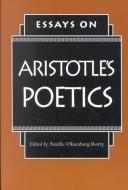
ISBN: 0691014981 0691068720 9780691014982 Year: 1992 Publisher: Oxford Princeton University Press
Abstract | Keywords | Export | Availability | Bookmark
 Loading...
Loading...Choose an application
- Reference Manager
- EndNote
- RefWorks (Direct export to RefWorks)
Aristotle --- Aesthetics, Ancient --- Poetics --- Tragedy --- Esthétique ancienne --- Poétique --- Tragédie --- Aristotle. --- Aesthetics, Ancient. --- Tragedy. --- History --- Esthétique ancienne --- Poétique --- Tragédie --- Drama --- Aristoteles. --- Ἀριστοτέλης. --- Poetics - History - To 1500.
Book
ISBN: 0415907454 0415001846 9780415001847 Year: 1988 Publisher: New York, N.Y. Routledge
Abstract | Keywords | Export | Availability | Bookmark
 Loading...
Loading...Choose an application
- Reference Manager
- EndNote
- RefWorks (Direct export to RefWorks)
Aristotle --- Nietzsche, Friedrich W. --- Plato --- Philosophy, Ancient --- Poetics --- Creation (Literary, artistic, etc.) --- Philosophie ancienne --- Poétique --- Création (Arts) --- Criticism and interpretation --- Critique et interprétation --- Philosophy. --- Philosophy, Ancient. --- History --- Philosophy --- -Poetry --- Ancient philosophy --- Greek philosophy --- Philosophy, Greek --- Philosophy, Roman --- Roman philosophy --- Mental philosophy --- Humanities --- -Technique --- -History --- -Philosophy --- Nietzsche, Friedrich --- Poétique --- Création (Arts) --- Critique et interprétation --- Criticism and interpretation. --- Poetics - History - To 1500.
Book
ISBN: 0837130719 9780837130712 Year: 1971 Publisher: Westport, Conn. Greenwood
Abstract | Keywords | Export | Availability | Bookmark
 Loading...
Loading...Choose an application
- Reference Manager
- EndNote
- RefWorks (Direct export to RefWorks)
Literary rhetorics --- Classical literature --- Rhetoric, Ancient --- Poetics --- History and criticism --- Theory, etc --- History --- -Poetics --- -Poetry --- Literature, Classical --- Literature --- Literature, Ancient --- Greek literature --- Latin literature --- Classical languages --- Greek language --- Greek rhetoric --- Latin language --- Latin rhetoric --- -Theory, etc --- -Technique --- Rhetoric --- -History and criticism --- -Rhetoric, Ancient --- Ancient rhetoric --- History and criticism&delete& --- Rhetoric, Ancient. --- Classical literature - History and criticism - Theory, etc --- Poetics - History - To 1500
Book
ISBN: 0521213312 9780521213318 Year: 1976 Volume: 7 Publisher: Cambridge
Abstract | Keywords | Export | Availability | Bookmark
 Loading...
Loading...Choose an application
- Reference Manager
- EndNote
- RefWorks (Direct export to RefWorks)
Comparative literature --- Literature --- anno 500-1499 --- Poetry, Medieval --- Poetics --- Rhetoric, Medieval --- History and criticism --- Theory, etc --- History --- -Rhetoric, Medieval --- -Poetry --- European poetry --- Medieval poetry --- -Theory, etc --- -Technique --- Rhetoric, Medieval. --- Theory, etc. --- -History and criticism --- -Poetics --- History and criticism&delete& --- Poetry, Medieval - History and criticism - Theory, etc --- Poetics - History - To 1500
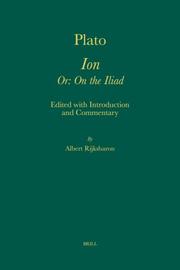
ISSN: 13806068 ISBN: 1281939676 9786611939670 9047422872 9789047422877 9789004163218 9004163212 9781281939678 6611939679 Year: 2007 Volume: v. 14 Publisher: Leiden Boston Brill
Abstract | Keywords | Export | Availability | Bookmark
 Loading...
Loading...Choose an application
- Reference Manager
- EndNote
- RefWorks (Direct export to RefWorks)
On the basis of a fresh collation of the four primary manuscripts, this book presents a revised text of Plato's Ion , with full apparatus criticus. The commentary has a strong linguistic orientation; it includes discussions of Platonic vocabulary. Linguistic considerations are also the leading principle in the choice of one MS reading rather than another. Drawing on Byzantine practices and theories, the book pays special attention to questions of punctuation, an area too often ignored in editions of classical texts. The extensive introduction deals with, inter alia, Plato's attack on poetry, the position of the Ion in the corpus Platonicum—rather late, this book argues—, the title(s) of the dialogue, the reasons why MS Venetus 189 should be considered a primary MS, and the text of the Homeric quotations in the Ion.
Poetics --- Aesthetics, Ancient. --- History --- Homer. --- Homer --- Ion (Plato) --- Literatura grega clássica (crítica e interpretação) --- Poesia. --- Homero --- Aesthetics, Ancient --- Poétique --- Esthétique ancienne --- Histoire --- Poetics - History - To 1500 --- Homer - Iliad --- Poétique. --- Platon (0427?-0348? av. J.-C.).
| Listing 1 - 10 of 36 | << page >> |
Sort by
|

 Search
Search Feedback
Feedback About UniCat
About UniCat  Help
Help News
News